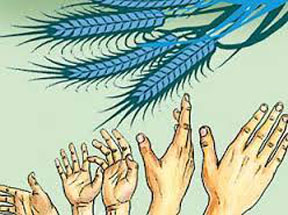 NEW DELHI: After three years of bumper crop harvest, India’s agriculture production may be impacted this year if a likely El Nino torpedoes monsoon rainfall, putting pressure on food prices, the Economic Survey said on Wednesday.
NEW DELHI: After three years of bumper crop harvest, India’s agriculture production may be impacted this year if a likely El Nino torpedoes monsoon rainfall, putting pressure on food prices, the Economic Survey said on Wednesday.
With Met department predicting 71 per cent probability of a sub-normal or deficient monsoon and spatial distribution of rainfall, the pre-Budget document said, agriculture output is likely to be impacted and consequently food prices.
There are concerns about the likely occurrence of the El Nino, when surface temperatures in the Pacific Ocean rise above average for several months which adversely affects weather in many regions, it said.
“This is likely to have an impact on India’s agriculture and consequently on food prices,” the survey said.
However, it added that there appears to be “no cause for alarm on the El Nino impact” as the country is well placed on food grains availability with record domestic production and huge stocks in the central pool.
The Met Department has projected below normal monsoon at 93 per cent of the long period average for this year. Till June, rainfall is deficient by 43 per cent. As a result, sowing has delayed and total areas planted to kharif crops is also lower by 43 per cent at 182.4 lakh hectares till July 4.
Noting that Indian agriculture has become more robust over the last decade with record output of food grains and oilseeds, the survey suggested that increasing the efficiency of the farm-to-fork value chain is crucial for eliminating poverty and malnutrition.
The survey listed the major challenges faced by the Indian agriculture sector that included low productivity levels, soil degradation and market distortions that prevent the creation of a national common market and phased shifting to direct transfer of fertilizer-food subsidies.
“A shift to direct cash transfer system or food stamps would anchor our food policy to the requirement of people and would additionally reduce the fiscal deficit,” it suggested.
Strengthening agriculture sector is crucial for poverty alleviation, ensuring food security, increasing employment opportunities and enhancing rural incomes, it added.
To address key challenges facing the farm sector, the survey called for “immediate attention” on marketing reforms, adoption of new technologies/inputs to boost crop yields and direct cash transfer of food-fertilizer subsidies.
Observing that government interventions in domestic and global marketing have served as a barrier to trade, the survey suggested removal of market distortions and to creation of greater competition. It also called for facilitating the setting up of a national agriculture market.
Among key reforms, the survey suggested the government to review Agriculture Produce Marketing Committee (APMC) Act, Essential Commodities Act and Land Tenancy Act to encourage free trade to boost supplies and curb price rise.
It suggested direct marketing and contract farming, inclusion of agri-related taxes under the general Goods and Services Tax (GST) and establishing stable trade policy based on tariff interventions instead of non-tariff trade barriers.
The survey also pitched for more investment in the sector by giving incentives to private sector.
“A plethora of government intervention for building marketing set up has in fact created barriers to trade. There is a need to facilitate a national common market for agricultural commodities with uniform taxes in the domestic market and to foster a long term stable trade policy for agricultural products,” the Survey said.
Expressing concern over lower crop yields, the Survey said the productivity of most crops in the country is lower than the global standards. “Without new technology and quality input, desired productivity level would be difficult to achieve.”
To augment food grains availability and cut food subsidy, the survey suggested that the government encourage states to undertake procurement of wheat and rice instead depending on Food Corporation of India alone.
“There is a need to expand the adoption of decentralized system of procurement for the Public Distribution System (PDS) from 11 Indian states and union territories at present to all states,” the survey said.
This would help save transport costs, reduce transit losses and other leakages, increase food availability, reduce food prices and ultimately rein in food subsidy, it added. –PTI




